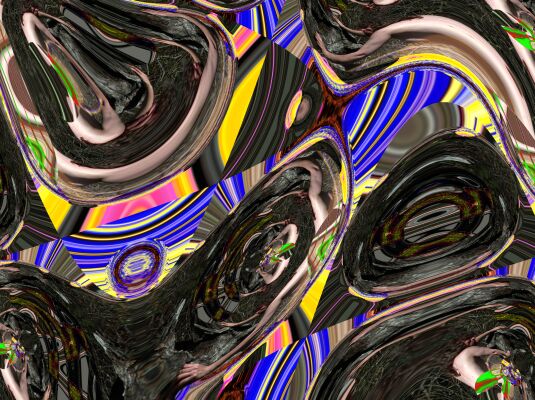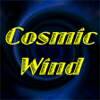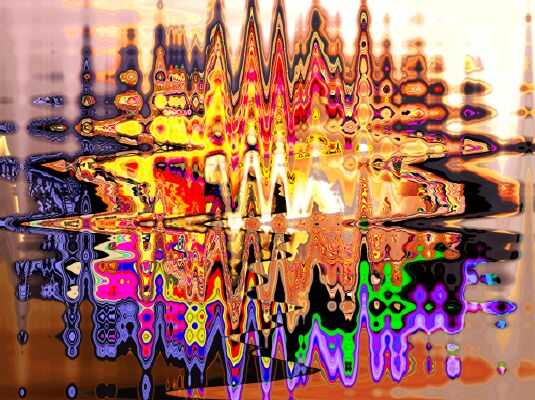

Art by Norman E. Masters
Kalevi wrote:
?I found out, when pondering on questions about life when
getting better, that the books that I eagerly read in my
childhood and adolescence had an effect of giving a false
image of life that might have had a crucial part in building
a "pseudo self" I had before I got paranoid after a
profound crisis when I was 18. I think this "pseudo self"
was so weak that it had to be broken under this crisis.?
Who am I? This question is not limited to people who suffer symptoms of schizophrenia or other disorders afflicting mental functions. It is a question known to have been asked throughout recorded history and continues to be asked universally by all sentient beings, at some time if not many times in their lives. This conundrum is confounded by the divergent functions of the very tool with which we seek the solution, our minds.
A mind experiences the sensations of the body in which it inhabits. It forms conceptual representations of these perceptions and it makes emotional judgments about their meaning and value. Is the "I" that I wonder about somewhere within this trinity of action, cognition and emotion? Is my "self" a purely mental being or does it have a corporeal and/or spiritual existence as well?
A mind remembers past events and has the power to envision events not necessarily possible. Recollections of what we have done and of the feelings we had about them then, coupled with what we feel about them now, are carried into our projections, influencing our expectations and shaping our choices. Is this feeling of whom I am who I am?
Emotions have changed little since the earliest days of human existence. The attachments of infant and mother, mother and infant are the same today as then. Male to male and female to female bonding are unchanged. Sexual impulses, possessiveness and greed are ancient and modern lusts. What of these am I?
Language adds an additional dimension to an individual's being. A mind associates feelings with words, giving words the power to evoke actions. We may direct our deeds with our words or impel others to act. Others may evoke our behaviors as well. Many believe that the creation of the universe began with the spoken word, "And God said, Let there be light: and there was light" (Genesis 1:3). For centuries the written word was believed to hold magical properties, and today most of the world's population practices prayer and other forms of incantation.
Among the earliest human intellectual notions was a recognition of animate and inanimate states. The force behind all animation was thought to be Spirit. Those who held this belief saw life as present in all things that moved, water, fire, clouds, as well as plants and creatures, and absent from inanimate objects. Many hold a similar view today. To them Death is literally the loss of one's spirit. An issue which agnosticism cannot resolve is whether one's Self stays with their Spirit or if it disintegrates with the body?
Before "civilization" evolved, a simpler social order existed. An individual's Self was centered in their biological being. Cognitive conceptions of self do not become possible until one's language has developed beyond basic vocal utterances that serve as rudimentary verbs, nouns and expletives. Are remnants of this preverbal Self aspects of whom I am now?
As Kalevi points out, through culture our society strives to inculcate a pseudo self in its members to satisfy the needs of the community. However, this process of formal persona formation ignores one's underlying attributes, often neglecting or interfering with the development of qualities unique to an individual. Would I be other than whom I am had my evolution not been diverted, my destiny subverted, to serve some social structure better? If so, can I ever return to the Self that nature had prepared me to be, or am I forever trapped within an unnatural existence?
How you come to think of your Self is partly the product of how significant adults thought about themselves and about you during your first five years of life. Too often a parent seeks to create qualities in their child that they wish they were seen as having, imposing a potentially ill-fitting persona upon a developing psyche. Sometimes parents try to hide the sordid sides of life, leading the child to believe in a kinder, gentler world than actually exists.
Wanting to preserve the innocence of childhood as long as possible, parents may unwittingly set their children up for a blind-sided face slap by reality. Shocks to an unprepared psyche require responses by defense mechanisms established in formative years. Increasingly primitive behaviors follow those that fail to resolve angst arising from perceived perturbations. Unless anxiety is adequately reduced, infantile mechanisms designed to elicit help from adults eventually become activated.
Modern science has found the genetic differences between humans and other species to be slight. The behavioral repertoire with which we are born is similar to those of non humans. The initial nature of every individual is animal. While the cunning of infants and toddlers is evolving, genetically directed survival mechanisms dictate their behaviors. How much of this primitive nature governs our current choices is difficult to determine. What part of whom I am at this moment is rooted in this primal presence?
Does mental maturity mean one has found their Self in a sum of the many selves that they are party to, or is there one "God Given" Self in a sea of pseudo selves occupying the same physical body? Is my Self a triumvirate of body, mind and spirit, a kind of democracy, or is one's Self solely, simply, I am that I am?
I believe the who that I am is much more than the body that bears my brain, more than the history of my family, more than my name with its antiquated reference to an ancestor's occupation. The continuously changing feelings that I have about myself -- this emotional lability resting upon the shifting sands of successive self-perceptions of momentary failures and successes -- cannot be central to the definition of my being.
Neither should this who that I am be confined to the character of my personality. Yet, if I am more than these, what else is there left to be?
Who am I? I cannot satisfactorily answer this question. I seem to contain contradictory characteristics that I am unable to resolve. A loving heart and a quick temper seem at odds with each other. Intertwining qualities of Light Spirit and Dark Flesh make recognizing my motives, past and present, difficult. The person that I thought I was in my thirties does not fully square with whom I think of myself as in my sixties, and a discontinuity seems to exist between then and now.
What I care about may be the key to answering the question of who I am. How I choose to be of service is likely more important than who I think I am. At the end of my life, only that which is responsible for the existence of everything will know and hopefully share the answer to who am I with me. If not, then I leave it to those who have known me to share their answer to my question with each other.

|

|

|